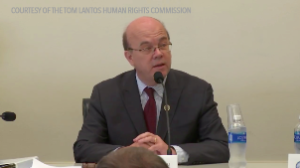The incoming executive director of the Drug Policy Alliance will have plenty of work to do.
Medical marijuana for vets hits a bump in the House, a federal medical marijuana research bill is introduced, a bid to expand medical marijuana in the Lone Star State gets stymied, and more.
It's jail guards gone wild this week, with a trio of correctional officers looking to make something on the side.
Massachusetts lawmakers approve the legal marijuana bill, the Justice Department officially resurrects "adoptive sharing" for asset forfeitures, Gallup says more Americans have smoked pot than ever, and more.
A congressional panel ripped into Philippines President Duterte and his bloody drug war Thursday, Kamala Harris and Rand Paul file a bail reform bill, a South Carolina Republican congressman files a bill to allow drug testing of unemployment applicants, and more.
A key Justice Deparatment report is slated to drop this week, so is a federal hemp bill, Indonesia's leader seems to be following in Duterte's footsteps, and more.
Congress will take up several amendments relating to marijuana policy this week, Maine is getting closer to agreement on how to implement legalization, fighting in Colombia's coca country is generating refugee flows, and more.
Maine legislators recommend a 20% tax on legal pot, a House committee blocks an amendment that would let VA doctors recommend medical marijuana, Philippines President Duterte is ready for another year of drug war, and more.
A Senate panel has approved an amendment barring the DOJ from going after medical marijuana states, criminal justice reform groups want close scrutiny of US Attorney nominees, a federal appeals court reinstates a lawsuit over a SWAT raid that turned up only tomatoes and tea leaves, and more.
This article was produced in collaboration with AlterNet and first appeared here.
Led by Ethan Nadelmann since its formation 17 years ago, the Drug Policy Alliance (DPA) has been the most influential drug reform organization in the country, with a hand in advancing the causes not only of medical marijuana and marijuana legalization, but of drug law reform more broadly, in all its manifestations and intersectionality.

Maria McFarland Sánchez-Moreno (Drug Policy Alliance)
Thanks in good part to Nadelmann's vision and the efforts of DPA -- and its campaign and lobbying arm, the Drug Policy Action Network -- in state houses and court houses, in Congress and the executive branch, in media outreach and educational campaigns, the drug laws in America have changed for the better. Pot has gone mainstream, the mass incarceration mania of the Reaganite drug war (abetted by too many Democrats) has broken, sensible and life-saving harm reduction measures are spreading.
But now Nadelmann is gone -- at least as director or staff -- and DPA and the drug reform community face a Trump administration apparently intent on reviving and revitalizing the worst of drug war practices from the last century. Nadelmann's successor not only has big shoes to fill, but also faces reactionary impulses in Washington.
That successor is Maria McFarland Sánchez-Moreno, holder of a law degree from New York University School of Law and for the past 13 years Co-Director of the US Program for Human Rights Watch (HRW), where she picked up plenty of domestic drug policy experience. There, she managed a team that fights against racial discrimination in law enforcement, punitive sentencing, and deportation policies that tear families apart -- all issues inextricably intertwined with the war on drugs.
The bilingual McFarland Sánchez-Moreno grew up in Peru and spent her early years at HRW researching Colombia, where drug profits helped fuel a decades-long civil war and corroded governmental legitimacy through corruption. That sharpened her awareness of the need for social justice and drug policy reform. She also pushed for the group to more directly take on the war on drugs as a human rights issue, and as a result, HRW became the first major international human rights organization to call for drug decriminalization and global drug reform. [Ed: McFarland's help and advice made it possible for Human Rights Watch to endorse our UNGASS sign-on statement.]
She is regularly quoted and published in national and international media, has testified before Congress on multiple occasions and has extensive experience advocating with US congressional offices, the White House, and the Departments of State, Justice and Defense. She recently authored a non-fiction book, There Are No Dead Here: A Story of Murder and Denial in Colombia, which will be published by Nation Books in February 2018.
Now, McFarland Sánchez-Moreno turns to drug reform as her primary remit, at the head of an organization with a $15 million budget; offices in California, Colorado, New Jersey, New Mexico, New York, and Washington, DC; a considerable cadre of experienced and talented professionals; and a well-earned reputation for being able to make drug reform actually happen. Drug War Chronicle spoke with McFarland Sánchez-Moreno on Friday about what lies ahead.
Drug War Chronicle: You're about to head the most powerful drug reform group on the planet. What is it about you and your experience that makes you the person for this job?

Mass incarceration is a drug policy issue. (nadcp.org)
I don't know that I'm the right person to ask about that, but I will say I have been passionate about drug policy for a long time; it cuts across many of the social justice issues that I've been involved with throughout my career, starting in Colombia documenting atrocities committed by armed groups who were overwhelmingly financed by illicit drugs and for whom trafficking was their reason for existing. I came to realize that if you got rid of the illicit market, you could do serious damage to those groups.
And that continued in my work at HRW's US Program, covering issues like criminal justice and immigration, where you see so many vast problems in this country that are strongly linked to the war on drugs. From mass incarceration to large-scale deportations, a lot of it is people getting convicted of low-level drug offenses. And this also connects to a fundamental matter of justice: People shouldn't face prison time for choices about what they put in their bodies, absent harm to others.
Drug War Chronicle: Does your selection suggest that DPA is going to be even more internationally focused than it is now?
McFarland Sánchez-Moreno: It's too early to say whether we will invest more internationally, but our main focus has to be domestic. We're a national organization with offices in many states, and we want to build on that strength. There's plenty of work to do right here, so we will remain focused on the US. While there is an argument to be made for the importance of international work, you don't need to worry about us shifting away from the home front.
Drug War Chronicle: What are some of the key global drug policy challenges? And where do you see opportunities for positive change?
McFarland Sánchez-Moreno: Both domestically and internationally, there's real momentum around drug reform. After Colombia, Mexico, and Guatemala called for an international discussion of drug policy, which led to last year's UN General Assembly Special Session (UNGASS) on Drugs, the nature of the debate around drugs began to change, and we're seeing real openness to reform in many countries. At the same time, in places like the Philippines or Indonesia, you see serious backsliding, with large scale killings in the name of fighting the war on drugs in the former and use of the death penalty in the latter. And in places like Mexico and Central America, we're seeing very serious violence related to drug prohibition.
The international situation is complex: There are some openings, some room for progress -- and when you have countries like Portugal and Uruguay moving toward reform and potentially setting good examples, that's something to point to here at home -- but we still have very, very serious problems associated with the war on drugs that we need to monitor and speak up about.
Drug War Chronicle: Here in the U.S., it's sort of a paradoxical situation. On the one hand, we have medical marijuana in 29 states, pot decriminalization in 13 or 14, and legalization in eight, with more likely to come in the next year or so. We have state legislatures enacting sentencing reforms and asset forfeiture reforms. At the same time, we have the Trump administration apparently leading federal drug policy down a retrograde prohibitionist path. How do you assess the overall situation?

The fight for legal marijuana will continue. (Creative Commons)
It's similar to the international situation in that there are enormous opportunities for progress around marijuana law reform and harm reduction measures in some places, but we have a federal Justice Department that seems to be intent on doubling down on the war on drugs and using the most draconian measures possible.
All the horrors we're seeing with overdoses is leading many people to do some serious soul-searching about what's the best way to address this problem, so we're seeing some progress on harm reduction measures like access to naloxone, for example. Now, there's room to have some conversations where there wasn't before, such as decriminalizing the possession of all drugs. A few years ago, that would have been a hard conversation to have, but HRW released a report last year calling for it and DPA has just released its own report echoing that call, and there is a real receptiveness in the public to talking about that. We're in a different place now and can make progress at the state and local level.
But that fairly heated rhetoric coming from the attorney general, appealing to people's worst fears and often distorting reality, is a real problem. It's not just about what Sessions says and what policies he adopts at Justice; it's also about that dark narrative starting to take hold, people in other parts of the government thinking its more acceptable to return to those failed policies. It's disturbing to see bills filed that are headed in the wrong direction, like Sen. John Cornyn's (R-TX) Back the Blue Act (Senate Bill 1134). A year ago, he was part of bipartisan sentencing reform. Why is he going the other way now?
And then there's Sen. Dianne Feinstein's Stop the Importation and Trafficking of Synthetic Analogues (SITSA) Act (Senate Bill 1237), which would give Sessions the power to schedule new synthetic drugs without any scientific basis. I think having someone who is so extreme in his views at the Department of Justice is a green light for people in other parts of the government to take us in the wrong direction. This is a major challenge for DPA and the drug reform movement in general, and we will be focusing on that right off the bat.
Drug War Chronicle: Let's talk about racial equity. How do we advance that? Whether it's participation in the legal marijuana industry or sentencing policy or consent decrees to rein in police departments, race is implicated.
McFarland Sánchez-Moreno: It's all bound up with what's coming out of Washington and the broader policies we're talking about. It's hard to disentangle racial justice issues from some of these other issues. We've been working on drug reforms in New Jersey and New York, and one of our biggest concerns has been to ensure that new reforms have a strong focus on empowering the very communities most damaged by the war on drugs. Making sure drug reforms takes that perspective into account and creates new opportunities for those communities is a critical part of our work.
Sessions backing away from consent decrees, the demonization of Black Lives Matter, and all that is very clearly tied to rhetoric coming from the White House and the Justice Department that is designed to stigmatize groups and lump people who use drugs in with drug dealers, with communities of color, with immigrants. They use that demonizing combination to justify very harsh policies that will be devastating to some of the most vulnerable communities in the country. We have to fight back against that; it's a big part of the story here.
And then there's the impact of the drug war on immigration policy. My colleagues at Human Rights Watch documented how a very large number of immigrants -- and not just undocumented ones -- ended up deported because they had a drug conviction, in many cases from many years back. They are torn apart from their families and often sent to places with which they have little connection, countries where they don't even speak the language. It's not just the deported -- their kids, parents, spouses, sibling, all of them suffer serious consequences. It's cruel and senseless.
It's very clear this administration has made immigration enforcement a top priority. Some very extreme portion of its base really views this as a priority. It's hard to talk to them, but most of the country favors immigration reform, and a very large and increasing number of people understand that using the criminal law when talking about drug use is harmful and makes no sense. If we can make progress on drug reform, we also make progress on immigration by reducing the number of people convicted and exposed to deportation. We have to talk about these issues together and work with immigration reform groups and take them on board in our joint fight.
back to top
Medical marijuana for vets hits a bump in the House, a federal medical marijuana research bill is introduced, a bid to expand medical marijuana in the Lone Star State gets stymied, and more.
NationalOn Monday, a federal bill to facilitate medical marijuana research was filed. A bipartisan group of representatives led by marijuana reformer Rep. Earl Blumenauer (D-OR) and anti-legalization Rep. Andy Harris (R-MD) has filed House Resolution 3391, the Medical Marijuana Research Act of 2017. The bill would remove barriers inhibiting medical marijuana research.
On Tuesday, the House Rules committee blocked an effort to let VA docs recommend medical marijuana. A proposed amendment to the Veterans Administration appropriations bill to allow VA doctors to recommend medical marijuana has been bottled up in the House Rules Committee. The same amendment actually passed the House last year, but committee Chair Rep. Pete Sessions (R-TX) refused to even allow a vote on it. The Senate version of the amendment is still alive, though, and if the Senate approves it again this year, it could still make it into the final appropriations bill.
Texas
Last Wednesday, a bid to expand medical marijuana was defeated. An effort to expand medical marijuana in the state was stopped by the House State Affairs Committee Wednesday. Rep. David Knoll (R) had tried to add an amendment to a special session bill authorizing the Texas Medical Board and other agencies, but the amendment never got enough support to come up for a vote.
US Virgin Islands
On Monday, a bill to legalize medical marijuana was reintroduced. Territorial Sen. Positive Nelson has refiled his Virgin Islands Medical Cannabis Patient Care Act. A similar bill died in committee last year, and Nelson wants to avoid a similar fate this year. "I'm requesting that this measure be heard by the committee of the whole, and not the Health Committee, whose chair has exhibited an obvious bias against cannabis legalization in any form," Nelson said.
[For extensive information about the medical marijuana debate, presented in a neutral format, visit MedicalMarijuana.ProCon.org.]
back to top
It's jail guards gone wild this week, with a trio of correctional officers looking to make something on the side. Let's get to it:
In Lawton, Oklahoma,
a Lawton Correctional Facility guard was arrested last Saturday after being caught coming to work with a diaper filled with marijuana. Two of her coworkers ratted her out for smelling like pot, and the as yet unnamed guard said she'd been around people smoking weed, but during a pat down search, she handed the diaper and a bag with 55 grams of weed in it to officers. She was also carrying a cell phone, two prepaid credit cards, and notebook with credit card numbers in it. She is charged with bringing contraband into the jail.
In Round Rock, Texas, a Williamson County jail guard was arrested last Tuesday after a drug-sniffing dog alerted deputies to his vehicle in the jail parking garage. Richard Acuna, Jr. went down after deputies then found cocaine in his car. He is charged with possession of a controlled substance. It's unclear whether he was bringing drugs to the jail.
In Rustburg, Virginia, a former Campbell County Adult Detention Center guard was arrested last Wednesday for allegedly giving prescription drugs to prisoners. Benjamin Joel Rackley is charged with handing out pills over a six-month period ending in February. He is charged with one count of conspiracy to deliver drugs to prisoners, one count of delivery of drugs to prisoners, and two counts distribution of a controlled substance.
back to top
Massachusetts lawmakers approve the legal marijuana bill, the Justice Department officially resurrects "adoptive sharing" for asset forfeitures, Gallup says more Americans have smoked pot than ever, and more.

California is on the verge of approving a state law to allow supervised injection sites to operate in the state. (vch.ca)
Gallup Poll Has Number Who Say They've Used Marijuana at All-Time High. Some 45% of American adults have tried marijuana, according to Gallup. That's an all-time high, and it's more than ten times the number (4%) who admitted smoking pot in 1969, the first year Gallup asked the question. About 12% said they currently use marijuana.
Massachusetts Legislature Approves Compromise Legalization Bill. The House and Senate both approved a compromise measure to implement marijuana legalization Wednesday. House Bill 3818 now heads to the desk of Gov. Charlie Baker (R), who is expected to sign it. The bill increases taxes from 12% to up to 20%, and would allow authorities in localities that didn't vote in favor of the legalization initiative to ban pot businesses without a popular vote.
Medical Marijuana
Texas Bid to Expand Medical Marijuana Defeated. An effort to expand medical marijuana in the state was stopped by the House State Affairs Committee Wednesday. Rep. David Knoll (R) had tried to add an amendment to a special session bill authorizing the Texas Medical Board and other agencies, but the amendment never got enough support to come up for a vote.
Asset Forfeiture
Justice Department Brings Back Aggressive Asset Forfeiture Policy. As Attorney General Sessions vowed earlier this week, the Justice Department on Wednesday formally unrolled a revamped "adoptive forfeiture" policy that will allow state and local law enforcement agencies to hand drug cases over to the feds to ensure that the cops get the great bulk -- 80% -- of the proceeds from seizures, in many cases doing an end-run around state asset forfeiture law. The program was halted by then-Attorney General Eric Holder in 2015 after a rising outcry over abuses. The move was praised by law enforcement but criticized by civil rights groups and even some members of Congress.
Heroin and Prescription Opioids
Rhode Island Governor Signs Package of Bills to Fight Opioid Epidemic. Gov. Gina Raimondo (D) Wednesday signed into law three bills aimed at the state's opioid problem. One allows law enforcement to access an electronic prescription database without a warrant, one requires doctors to discuss the risks of addiction with patients when prescribing opioids, and one expands the kind of drugs that can be electronically prescribed. "Every Rhode Island community has been touched by this crisis, and I'll take every step I can to fight back," Raimondo said in a signing statement.
Harm Reduction
California Safe Injection Site Bill Awaits Senate Floor Vote. A bill that would allow supervised injection sites in the state has already passed the Assembly and has now been approved by both the Senate Health Committee and the Public Safety Committee. Assembly Bill 186, sponsored by Assemblywoman Susan Talamantes Eggman (D-Stockton) now awaits a Senate floor vote. If the bill passes, it will go back to the Assembly for concurrence, and then to Governor Jerry Brown's desk.
back to top
A congressional panel ripped into Philippines President Duterte and his bloody drug war Thursday, Kamala Harris and Rand Paul file a bail reform bill, a South Carolina Republican congressman files a bill to allow drug testing of unemployment applicants, and more.

US Rep. Jim McGovern (D-MA) at hearing of congressional Tom Lantos Human Rights Commission Thursday. (TLHRC)
Maine House Approves Bill Requiring Marijuana Be Tested for Safety. The House on Thursday overwhelmingly approved a bill that would require the state Agriculture Department to set up testing facilities for marijuana before it could be sold. This is the first bill from a special select committee of legislators charged with creating a regulatory regime for legal pot. It goes against the wishes of Gov. Paul LePage (R), who wants the Bureau of Alcoholic Beverages and Lottery Operations to be in charge of all legal marijuana regulations.
Criminal Justice
US Sens. Kamala Harris, Rand Paul File Federal Bail Reform Bill. Sens. Kamala Harris (D-CA) and Rand Paul (R-KY) filed the Pretrial Integrity and Safety Act of 2017 on Thursday. The purpose of the bill is "to encourage states to reform or replace the practice of money bail, the requirement that individuals awaiting trial remain in jail unless they pay for their release." Without being able to make bail, people charged -- but not convicted -- with a crime can spend weeks or months behind bars, with devastating consequences for employment, finances, and families. The bill is not yet available on the congressional web site.
Drug Testing
South Carolina Rep Files Federal Unemployment Drug Testing Bill. US Rep. Buddy Carter (R-SC) filed a bill on Thursday that would let states screen unemployment applications for drug use and force them to undergo drug testing in some circumstances. The bill would deny unemployment benefits for 30 days to anyone testing positive for drug use, and a second positive drug test would result in a year-long ban. The bill is not yet available on the congressional website.
International
US Lawmakers Rip Philippines Drug War Abuses. At a hearing of the Congress's Tom Lantos Human Rights Commission on Thursday, American lawmakers ripped into Philippines President Rodrigo Duterte over drug war abuses, including the killing of thousands of drug suspects, and called on President Trump to condemn Duterte -- and to rescind an invitation to visit the White House. Rep. Jackie Speier (D-CA) said she was "troubled" by the invite, while Rep. Jim McGovern (D-MA) said he would "lead the protest" if Duterte shows up. "President Duterte, by all accounts, seems to not have a high regard for human rights," McGovern said. "The United States government cannot afford any degree of complicity with the kinds of human rights violations that are occurring," he said. "No other country -- I repeat that, 'no other country' -- comes to mind where people are assassinated on the streets in the name of fighting drugs, and leaders brag about it as a good thing," he added.
UN Says Bolivia Coca Cultivation on the Rise. The UN Office on Drugs and Crime (UNODC) has expressed concern about what it says is a 14% increase in land under coca cultivation. "This increase is a concern for us," said UN Drugs and Crime Representative of Bolivia, Antonio De Leo. Bolivian President Evo Morales expressed regret at the report, but noted that much more illicit coca is being grown in Colombia and Peru.
back to top
A key Justice Deparatment report is slated to drop this week, so is a federal hemp bill, Indonesia's leader seems to be following in Duterte's footsteps, and more.

What is Attorney General Sessions cooking up for pot policy? We should know this week. (senate.gov)
Justice Department Report to Be Released This Week Could Include Crackdown on Marijuana. A Justice Department Task Force on Crime Reduction and Public Safety, led by Attorney General Jeff Sessions, is set to release its report this, and reformers and industry insiders worry the report will try to link marijuana to violent crime, laying the basis for a crackdown on marijuana users and purveyors.
Massachusetts Local Control Compromise Could Face Legal Challenge. A legislative compromise that would let elected leaders in some communities ban marijuana businesses without a popular vote could be challenged as unconstitutional under state law. Under the compromise, if a majority of a local jurisdiction opposed the 2016 legalization initiative, local leaders could ban without a popular vote, but if the majority voted for the initiative, a ban would require a popular vote. The initiative itself called for no bans without a popular vote. Senate Minority Leader Bruce Tarr (R-Essex) warned that the compromise language could be challenged on the basis it violates equal protection laws.
Medical Marijuana
Virgin Islands Medical Marijuana Bill Reintroduced. Territorial Sen. Positive Nelson has refiled his Virgin Islands Medical Cannabis Patient Care Act. A similar bill died in committee last year, and Nelson wants to avoid a similar fate this year. "I'm requesting that this measure be heard by the committee of the whole, and not the Health Committee, whose chair has exhibited an obvious bias against cannabis legalization in any form," Nelson said.
Hemp
Federal Hemp Bill to Be Filed This Week. US Rep. James Comer (R-KY) is expected to introduce the Industrial Hemp Farming Act this week. The bill, versions of which have been introduced in each Congress since 2009, would remove industrial hemp from the definition of marijuana under the Controlled Substances Act and would allow research on hemp with up to 0.6% THC -- up from 0.3% in earlier bills.
Immigration
Permanent Resident Set to Be Deported for Marijuana Wins in Federal Appeals Court. The US 7th Circuit Court of Appeals in Chicago has ruled in favor of permanent resident Ming Wei Chen, who had been ordered deported from the country after a marijuana conviction. The court ruled that the Board of Immigration Appeals misapplied Supreme Court rulings when it held his conviction constituted an "aggravated felony."
International
Indonesia's President Tells Police to Shoot Drug Dealers. President Joko Widodo has told police to shoot drug traffickers as part of his efforts to fight a "narcotics emergency" in the country. "Be firm, especially to foreign drug dealers who enter the country and resist arrest. Shoot them because we indeed are in a narcotics emergency position now," Widodo said in a speech last Friday. The remarks drew comparisons with statements from Philippines President Rodrigo Duterte, who has overseen a drug crackdown that has left thousands dead there.
Amidst Violent Gun Battles, Mexico City Sees First Narco-Blockade. Mexican marines engaged in a gun battle with drug gangsters in the capital's Tlahuac neighborhood, leaving eight gunmen, including Tlahuac Cartel leader Jesus Perez Luna dead. During the shoot-out, dozens of people blocked streets in the area, setting on fire a truck and two stolen minibuses in a "narco-blockade" aimed at preventing the arrival of police and military reinforcements. That's a first for Mexico City.
Poland Legalizes Medical Marijuana. Polish President Andrzej Duda has signed a bill legalizing medical marijuana in the country. Patients will not be able to grow their own, but will be able to obtain imported marijuana products at pharmacies. The law allows people with severe illnesses to use medical marijuana if approved by a physician, but has no list of qualifying conditions. The law will go into effect in October.
back to top
Congress will take up several amendments relating to marijuana policy this week, Maine is getting closer to agreement on how to implement legalization, fighting in Colombia's coca country is generating refugee flows, and more.

Fighting at the edge of coca country in Colombia generated refugee flows last week. (dea.gov)
Congress Takes Up Marijuana Issues This Week. The Congress will take up several marijuana-related amendments this week. The House will take up amendments seeking to allow veterans to get medical marijuana recommendations through the Department of Veterans Affairs. A similar measure has already passed the Senate Appropriations Committee. The Senate Appropriations Committee will take up renewing a federal ban on spending to interfere with state marijuana laws. The House version of the amendment has already passed the House Appropriations Committee. And the House Rules Committee will take up an amendment protecting water rights for state-legal marijuana growers.
Maine Lawmakers Near Agreement on Legal Pot Rules. The special legislative panel overseeing implementation of the state's voter-approved pot legalization law has nearly finished its work. It has already agreed to remove the cultivation cap in the initiative and to block regulators from setting limits on cultivators, while adding a six-month state residency requirement for growers and sellers aimed at limiting out-of-state companies from dominating the market. The panel is leaving local control alone, meaning localities could ban pot businesses. And while it hasn't agreed on a final tax rate yet, it looks like it will be relatively low compared to other legalization states, coming in at between 10% and 20%.
Drug Testing
Maine Labor Department Tells Employers Not to Test for Pot Pending Changes in State Law. The Labor Department said most businesses should not test workers and job applicants for marijuana because the state does not have laws on the books. The Labor Department urged the legislative panel charged with implementing legalization to write laws that would clearly spell out what testing regimes would be allowed.
International
Fighting in Colombian Coca Zones Displaces Hundreds. Colombian security forces and an "unidentified illegal armed group" have been engaged in armed clashes in the municipality of Hacari in Norte de Santander state for several days, according to the United Nations. As a result, more than 200 locals have fled. The area is near Catatumbo, where there is more coca than government presence, and where dissident leftish guerillas and rightist paramilitary forces have been active.
back to top
Maine legislators recommend a 20% tax on legal pot, a House committee blocks an amendment that would let VA doctors recommend medical marijuana, Philippines President Duterte is ready for another year of drug war, and more.

Filipino strongman Rodrigo Duterte vows more bloody drug war. (Creative Commons)
Maine Legislative Panel Proposes 20% Marijuana Tax. The committee charged with drawing up regulations for the state's legal marijuana industry is proposing that recreational marijuana be taxed at a rate of 20%, with 5% paid to localities that allow cultivation or retail businesses. There would be a 10% wholesale excise tax and a 10% sales tax on retail sales. The proposed tax is double what voters approved when they passed a legalization initiative last fall.
Medical Marijuana
Federal Bill to Facilitate Medical Marijuana Research Filed. A bipartisan group of representatives led by marijuana reformer Rep. Earl Blumenauer (D-OR) and anti-legalization Rep. Andy Harris (R-MD) has filed House Resolution 3391, the Medical Marijuana Research Act of 2017. The bill would remove barriers inhibiting medical marijuana research.
House Rules Committee Blocks Effort to Let VA Docs Recommend Medical Marijuana. A proposed amendment to the Veterans Administration appropriations bill to allow VA doctors to recommend medical marijuana has been bottled up in the House Rules Committee. The same amendment actually passed the House last year, but committee Chair Rep. Pete Sessions (R-TX) refused to even allow a vote on it. The Senate version of the amendment is still alive, though, and if the Senate approves it again this year, it could still make it into the final appropriations bill.
International
Philippines President Duterte Vows to Continue Drug War. In his second state of the nation speech Monday, Philippines President Rodrigo Duterte vowed to continue his bloody war on drugs, warning that offenders will end up "in jail or hell." He also exhibited bravado as he brushed off international criticism, saying that he wasn't scared of the International Criminal Court and was "willing to go to prison for the rest of my life." He also called on Congress to reinstate the death penalty for drug offenses.
back to top
A Senate panel has approved an amendment barring the DOJ from going after medical marijuana states, criminal justice reform groups want close scrutiny of US Attorney nominees, a federal appeals court reinstates a lawsuit over a SWAT raid that turned up only tomatoes and tea leaves, and more.

A Kansas SWAT team looking for a pot grow raided a couple who were only growing tomatoes. Now, their lawsuit can proceed.
Senate Panel Approves Amendment Defunding DOJ Medical Marijuana Enforcement. The Senate Appropriations Committee voted Thursday to approve an amendment that would block the Justice Department from spending any funds to go after medical marijuana in states where it is legal. The amendment, which passed with strong Republican support, is a striking rebuke to Attorney General Jeff Sessions, who had personally requested that Congress kill the amendment. A House committee yesterday killed a similar amendment, but if the Senate amendment stays in the appropriations bill, it could be the basis for conference committee negotiations later.
Nevada Supreme Court Upholds Medical Marijuana Registry. In a Tuesday decision, the state Supreme Court unanimously upheld the constitutionality of the state's medical marijuana registry. The program had been challenged by a John Doe lawsuit, which complained that the registry and associated fees violated his due process rights. The lawsuit was rejected by lower state courts, and now the state's highest court has agreed.
Law Enforcement
Reform Groups Call on Senate to Closely Scrutinize Trump's US Attorney Nominees. A number of criminal justice reform groups on both the left and the right are calling on Senate Judiciary Chairman Sen. Chuck Grassley (R-IA) to have committee members actually question nominees, whether at hearings or in writing. The groups, which include Families Against Mandatory Minimums, Right on Crime, and the American Conservative Union, want nominees' positions on key issues such as asset forfeiture, sentencing policy, and respecting the authority of states to be made clear. "In view of the recent policies announced by the Department of Justice (DOJ), it is even more important that the Senate understand each nominee's views of the proper role government attorneys play in seeking justice rather than merely 'winning' the cases they bring," the groups wrote. The coalition made an initial request to Grassley in March, but got no response.
Federal Appeals Court Reinstates Lawsuit Against Kansas Cops Who Led SWAT Raid Against Couple Growing Tomatoes. In a blistering decision, the 10th US Circuit Court of Appeals reinstated a lawsuit filed by a suburban Kansas City couple after a SWAT-style raid based on the couple's visit to a garden supply shop and a faulty field drug test that said tea leaves in their trash were marijuana. There was no marijuana. The family sued the Johnson County Sheriff's Office after the 2012 raid. A federal judge dismissed the lawsuit in 2015, but now the 10th Circuit has overruled him.
back to top










